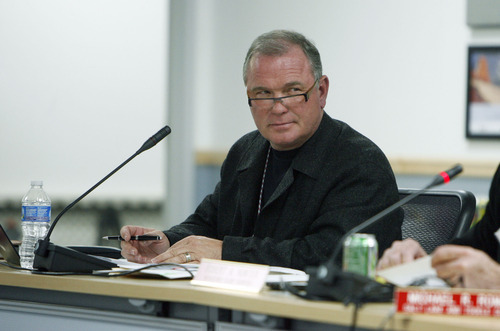This is an archived article that was published on sltrib.com in 2011, and information in the article may be outdated. It is provided only for personal research purposes and may not be reprinted.
As the Utah Attorney General's Office continues to investigate whether former Utah Transit Authority board member Terry Diehl misused official information to enrich himself in land dealings, the UTA board took some first steps Wednesday to amend its ethics rules.
The UTA board's Stakeholder Relations Committee endorsed a first draft of new rules, which are expected to go later to the full board.
UTA Senior Counsel Jennifer Rigby said the changes were made to address criticism in a legislative audit last year that said Diehl broke the law by misusing official information about the location of a potential commuter rail station in Draper by buying rights to develop land around it.
Back-up records to the legislative audit said Diehl was paid "in the millions and less than $24 million" when he sold his rights to development there. Diehl, however, says most of that was to reimburse costs, and said he "made very little" profit.
Paul Murphy, spokesman for the Attorney General's Office, said Wednesday that an investigation is continuing into whether Diehl broke the law, as the audit alleges.
The proposed ethics changes more clearly spell out what potential conflicts of interest must be disclosed by board members, and list some conflicts that would force a member to leave the board.
For example, new rules would prohibit any board member or close relative from having any financial interest in companies involved in "transit oriented development" if the UTA is one of the partners — a change made to comply with an ethics law passed by the Legislature this year.
That still may not have forced Diehl off the board amid controversy last year because the UTA was not a formal partner in development Diehl was seeking around the Draper FrontRunner station.
Last May, Diehl resigned from the UTA board under pressure. UTA Board Chairman Greg Hughes said then that the board pushed Diehl to resign to stop him from continuing to develop land around transit stops while serving on the board — which he said Diehl could legally do as long as he disclosed interests and recused himself from votes.
To persuade Diehl to go, the board voted after a closed-door meeting to pass a resolution to waive the normal yearlong ban on former board members from doing business with it. Diehl said in September that he has been exploring involvement in more transit-related developments with UTA.
The proposed new policy still allows board members to have interests in companies doing business with UTA or that would benefit from board decisions as long as they disclose their interests and abstain from voting if they own more than 10 percent of the firm's stock or are an officer or employee.
The new policy also clearly requires board members to disclose if they are rendering any services to companies or contractors involved with the UTA, or "any other potential conflict of interest, directly or indirectly with respect to … service as a member of the board."
The policy says such disclosures should be made on forms that members file annually with the board. But if a potential conflict arises just before a meeting, members may disclose it orally. The policy allows the board to determine if the member with a possible conflict can participate in discussions, or must even leave the meeting while any related action is debated.
Hughes, who is also a state legislator, said Wednesday that he will always encourage board members to go beyond the minimum disclosures required.
"Wherever we can, we should be as transparent as possible," he said. "We should err on the side of caution" when in doubt on whether to disclose potential conflicts or not.



